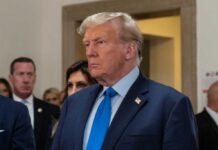
Republican senators are searching for answers after a former agent with the Federal Bureau of Investigation said he had to sign a nondisclosure agreement that didn’t include whistleblower exceptions that would have allowed him to speak to Congress.
Those exceptions are required by law and have been for more than 10 years. No federal agency is allowed to use any money from taxpayers for the purpose of NDAs if they don’t include whistleblower exceptions.
That is at the heart of the letter that Senators Ron Johnson of Wisconsin and Chuck Grassley of Iowa sent recently to the Department of Justice, demanding answers as to why.
Last fall, Steve Friend, a former Special Agent with the FBI, said the agency didn’t follow its own rules when it probed the January 6 Capitol riot and used many excessive tactics. He provided to the Republican senators the NDA that the FBI forced him to sign that didn’t include the required provision regarding anti-gag rules.
In a letter that the two senators sent to both Christopher Wray, the director of the FBI, and Merrick Garland, the U.S. attorney general, last week, they wrote:
“These accountability measures are critically important because they ensure whistleblowers know they have the right to disclose government fraud, waste and abuse to Congress and Inspectors General. Federal agencies cannot conceal their wrongdoing behind illegal nondisclosure agreements and related documents.”
Among the things the senators are demanding are information about how the FBI specifically treated Friend. They also want to know how often the FBI forced their employees to sign NDAs that didn’t include the required whistleblower exceptions.
Both of those senators sent another letter to Michael Horowitz, the inspector general of the DOJ, informing him of “additional acts of apparent wrongdoing by the FBI.” They also asked that his office “investigate the FBI’s alleged retaliation against former Special Agent Friend.”
The push from both Johnson and Grassley to investigate the FBI and its treatment of Friend was celebrated recently by people outside of government, too. Tristan Leavitt, who serves as the president of Empower Oversight – a non-profit watchdog organization – said:
“The FBI is not above the law, and Congress needs to hold it accountable. Congress cannot allow agencies to thumb its nose at its power of the purse. Those who blow the whistle deserve to be protected, not punished and silenced.”
Last fall, Friend – who was an FBI agent in Florida – said the agency designed certain cases so they would exaggerate the threat that domestic terrorism posed in America. It even used excessive tactics meant to ensure “the process is the punishment,” even in cases where the suspect was believed to be innocent.
As Friend said then:
“We took an oath, before our family and our friends and the Lord Almighty, and we are supposed to be people of integrity. And that’s not a leisure pursuit. And if you are indeed a person of fidelity, bravery, integrity – the FBI motto – and you have to be willing to do things that aren’t easy, especially when they’re as simple as stepping up and pointing out when we are not meeting the standards that we have set out for ourselves.”













